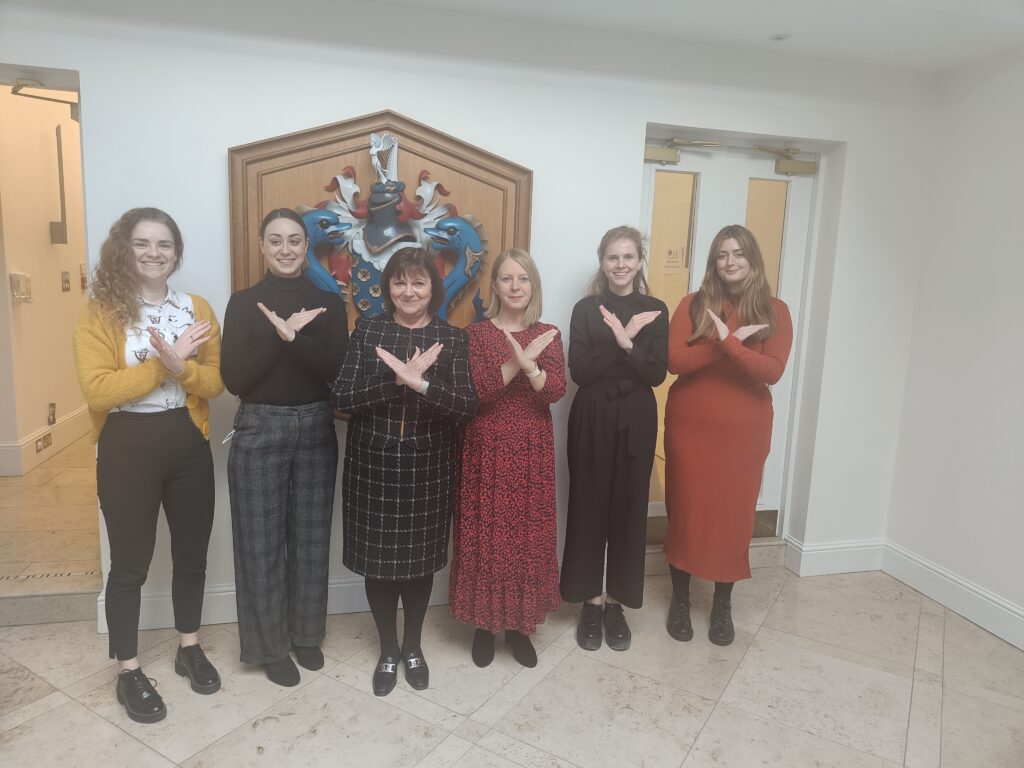International Women’s Day 2022 – #BreakTheBias
Today March 8th is International Women’s Day.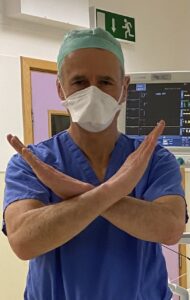
Our College is proud to mark it by publishing messages from some remarkable women who are leaders in our community. Although we, as a College, claim trust and partnership as core values, we do not live in a gender equal world. In medicine, gender inequity takes many forms; but perhaps implicit gender bias is the most pervasive and influential. Although it operates in an invisible sphere, it produces remarkable discriminatory effects. A classic Swedish study demonstrated that women needed 2.5 times as many impactful publications to receive an equivalent score on grant reviews as their male counterparts.[1] In the US and elsewhere, the percentage of female anaesthesiologists who hold senior academic ranks or leadership roles, lags behind the percentage of female anaesthesiologists overall.[2] Effective corrections will not be easy, but are necessary. Today we hear the voices of some of those women who lead our College as we continue to put those corrections in place.
[1] Wenneras C, Wold A. Nepotism and sexism in peer-review. Nature 1997; 387:341-3
[2] Gonzalez LS et al. Gender distribution in United States anaesthesiology residency programme directors: trends and implications. British Journal of Anaesthesia, 124 (3): e63ee69 (2020)
Dr Anne Hennesy, CAI Honorary Secretary
Throughout my career I have been inspired by the dedication and professionalism of talented female colleagues, consultant and trainee alike. I am, in equal parts, proud and grateful to be part of a profession which actively promotes, celebrates and supports the role of, and contribution by, women in our specialty. While not the first Irish College to elect a female President The College of Anaesthesiologists of Ireland elected two in succession both of whom made significant inroads in the advancement of our College and continue to contribute actively to our specialty. Currently one third of the elected membership of the College Council are female, a percentage which is increasing year on year. I am also fortunate to work in a hospital in which more than half of the consultant staff in the department of anaesthesiology, intensive care and pain medicine are female. There is much work to do however to ensure equal opportunity in all aspects of the medical profession, let us continue to be leaders in the field.
Dr Niamh Hayes, Chair Education Committee & Professional Competence Scheme
Virginia Apgar — exceptional academic achievement in college, while playing violin for the orchestra, and participating in seven different sports teams. One of the first female surgical residents at Columbia, the first female board-certified anaesthesiologist and professor in anaesthesiology in Physician’s and Surgeons, and director of anaesthesiology at Presbyterian. A founder of the science of neonatology, a saviour of countless infants, and the creator of the first great scoring system in medicine. The first woman on the Executive Committee of ASA, and a professor at Johns Hopkins later in life. Of course, in her spare time she made stringed instruments, flew planes, gardened, golfed, fly fished, and played the violin. Emmanuel Papper is less famous, but he got the professorial post at Physician’s and Surgeons ahead of Virginia in 1949. It was an unexpected appointment and considered by most biographers to be one of many disadvantages she experienced in her lifetime because of her gender.
The reason why women are not found in higher positions in medicine to the same degree as men is not because they are neither talented or driven enough to fill these roles. While this is a story from a lifetime ago, conscious and unconscious bias, cultural and structural factors influence advancement of women in medicine today. I applaud Professor Papper, he deserved his post I am sure, and worked hard to gain his position from the Harlem tenement where he grew up. But I also think that because a few women have broken through (eventually) doesn’t mean there’s not a wall to climb. Bias is unconscious, deeply ingrained, and informed by observing social, familial and institutional environments from childhood. On international women’s day, I ask every affiliate of the College of Anaesthesiologists of Ireland to consider their own personal bias in equality, diversity and inclusivity, and to enthusiastically support the committed position of our college to develop a culture of change in this respect. Those clinical leaders in positions of responsibility who want change, who are willing to provide mentorship and leadership to women in our profession, please stand up! Who is overlooked as the next anaesthesiologist from disadvantage to advance our profession and ourselves?
Dr Deirdre McCoy, Chair Quality & Safety Advisory Committee
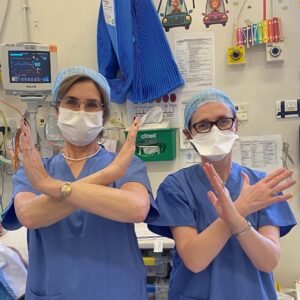 On IWD 2022 we commemorate our anaesthesiology luminaries and researchers including Sarah Joyce O’Malley (1896–1959), Katharine Georgina Lloyd-Williams (1896–1973), Virginia Apgar (1909–74) and Frances Mary Lehane (1944-2013).
On IWD 2022 we commemorate our anaesthesiology luminaries and researchers including Sarah Joyce O’Malley (1896–1959), Katharine Georgina Lloyd-Williams (1896–1973), Virginia Apgar (1909–74) and Frances Mary Lehane (1944-2013).
However notwithstanding significant progress and recognition of women anaesthesiologists’, educators’ and researchers’ critical contributions to the profession and to the health of our patients, both women and men; women in anaesthesiology, as in other medical specialities, remain under-represented in leadership and in academic positions compared with the proportion in medicine. (1)
Inherent to The College of Anaesthesiologists of Ireland’s primary mission to train the next generation of anaesthesiologists is a responsibility to recognise that the physiological necessities and safety underpinning Maslow’s hierarchy remain fundamental to attaining self-actualisation. (2) Ensuring success requires identification and evaluation of effective strategies to improve gender equity gaps in anaesthesiology (1) all of which include implicit bias awareness. (3, 4)
Acknowledging that ‘leaning-in’ (5) in the face of implicit and explicit gender bias and ‘a seat at the table is no longer enough’ (6), The College of Anaesthesiologists of Ireland continues to amplify women’s voices, to support opportunities and to encourage participation, contributing to the practice and science of anaesthesiology and to the quality of patient care.
- The Lancet February 09, 2019 Volume 393 Number 10171 p493-610
- Lane-Fall M, Gordon E, Valentine E, Black S, Kapur P, Fleisher L. Fostering belonging in academic anaesthesiology: faculty and department chair perspectives on supporting women anaesthesiologists. Br J Anaesth. 2020; 124: e155-e159
- Leslie K, Kasza J. Sex and gender inclusion, analysis and reporting in anaesthesia research. Br J Anaesth. 2020; 124: e43-e49
- Bosco L, Hastie M, Flexman A, Lorello G.Women in anaesthesia: a scoping review. Br J Anaesth. 2020; 124: e134-e147
- Sandberg S. Lean in: women, work, and the will to lead. 1st Ed. Alfred A. Knopf, New York 2013
- Patel R, Moonesinghe S. A seat at the table is no longer enough: practical implementable changes to address gender imbalance in the anaesthesia workplace. Br J Anaesth. 2020; 124: e49-e52
Dr Therese O’Connor, Chair HSE Committee
Break the bias
(an offering for my younger colleagues of all genders)
To recognise it when you hear it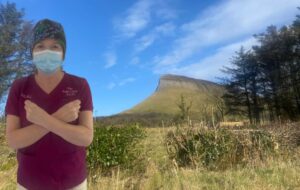
To see the question and to ask it
To take the trouble
To not let it pass
To pick up on the detail
To follow the thread
To sweat the small stuff
To face the frustration
To roll with the punches
To hang in there
To take the long view
To try
To remind those who would forget
To laugh in the face of presumption
To sidestep the branding
To throw cold water on the mistruth
To not accept what can be changed
To go to the meeting
To pen the email
To follow the process
To pursue the trail
To take the small steps
To summon the courage
To believe
To walk the line
To keep the balance
To avoid the righteousness
To appreciate all colleagues
To shake it off
To shake it off some more
To celebrate the difference
Dr Michelle Duggan, Co-Chair Wellbeing Committee
International Women’s Day is March 8th and this year’s theme is # break the bias.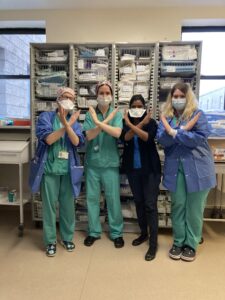
Females were first allowed entry to study medicine in Ireland in the late 1800’s. By the 1920’s females made up 1% of medical students. Today that figure is over 50%.
The College of Anaesthesiologists of Ireland are supporting women with the introduction of less than full-time training. Currently females are underrepresented at consultant level in all specialties and only 34% of consultant anaesthesiologists are female. With flexible training, this percentage should increase.
Despite the under-representation, we have been fortunate to have two female presidents of our college in the last number of years. Both Dr Jeanne Moriarty and Professor Ellen O’Sullivan were outstanding presidents and role models for all female anaesthesiologists. For the first time this year the College of Anaesthesiologists will have more than 50% female speakers at our Annual Congress of Anaesthesiology. This strong female participation in leadership roles is very encouraging for the future.
On a more global level, the world faces uncertainty with the Ukraine crisis. Ursula von der Leyen, President of the European Commission is leading Europe’s response. Certainly this contrasts strongly with the last major war in Europe over 70 years ago which was male dominated.
# break the bias.
Dr Eilis Condon, Deputy Director of Postgraduate Training
The theme for International Women’s Day 2022 is #BreakTheBias. We are asked to imagine a world free of bias, stereotypes and discrimination. My own experience of working as an Anaesthesiologist for over 20 years, is that thankfully women are, for the most part, accepted and acknowledged as integral members of the team, and increasingly in leadership roles.
Unfortunately, sexism still does exist in medicine to varying degrees. Discrimination persists within all specialties and grades.
None of us will #BreakTheBias alone, but we can work as a team to overcome obstacles that are very specific to women. We should always believe in ourselves, our abilities and our successes – we have earned them. We need to celebrate each other’s achievements, be kind to each other and stand strong together. We also need to accept our differences – strong leaders are empathetic and good listeners. You do not need to shout to be heard.
In the words of Michelle Obama: “Don’t be afraid. Be focused. Be determined. Be hopeful. Be empowered.”
Dr Kirsten Joyce, Chair CAT Committee
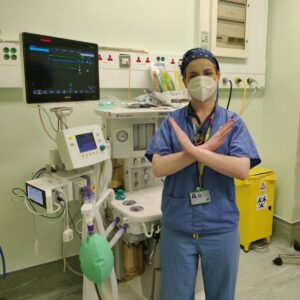 In 1929, Dr Sarah Joyce-O’Malley became the first woman in Ireland to be employed as an anaesthetist at the Central Hospital, Galway. She had completed her medical training in University College, Galway where she was one of just four female graduates in a class of one hundred.[1]
In 1929, Dr Sarah Joyce-O’Malley became the first woman in Ireland to be employed as an anaesthetist at the Central Hospital, Galway. She had completed her medical training in University College, Galway where she was one of just four female graduates in a class of one hundred.[1]
Almost a century on, our current cohort of anaesthetic trainees at the College of Anaesthesiologists of Ireland comprises over 40% female doctors. At an even more local level, for the first time since its inception in 2011, our own Committee of Anaesthesiology Trainees is made up of a majority of female members.
While there are still ongoing challenges facing women in medicine, I’m both excited and hopeful to see change year on year. I’m lucky to have worked with many inspirational female consultants in anaesthesia and intensive care and consider many of them to be mentors both professionally and personally. I’m very proud to be a part of our profession’s changing landscape, although I’ll never take for granted the giants on whose shoulders I find myself standing on.
- O’Brien K, O’Brien B. The life and times of the remarkable Dr Sarah O’Malley [Internet]. Medical Independent. April 2020 [cited 30 January 2022]. Available from: https://www.medicalindependent.ie/the-life-and-times-of-the-remarkable-dr-sarah-omalley/
Ms Margaret Jenkinson, CAI Chief Operations Officer
I feel very privileged to work in the College of Anaesthesiologists of Ireland. My journey with the College began in January 2007 when I took up the post of Finance Officer. In February 2017, I became the first Chief Operations Officer of the College. As we approach Internationals Women’s Day 2022, I look back at 2009-2015. In 2009, Council appointed our first female President Dr Jeanne Moriarty, followed by Prof Ellen O’Sullivan in 2012. I am fortunate to have worked with such inspirational females and also, with many incredible and dedicated female directors over the past fifteen years. I think that fairness and equality are defining issues in my everyday life in the College.
